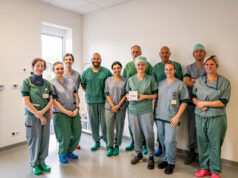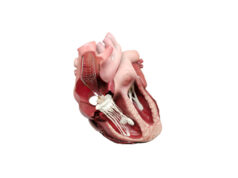Use of a TriClip (Abbott) for edge-to-edge repair in patients with tricuspid regurgitation appears to be a safe procedure, according to 30-day data from the TRILUMINATE clinical trial which were presented at EuroPCR 2019 (20–24 May, Paris, France). In addition, it effectively reduced tricuspid regurgitation by at least one grade at 30 days, and had a low complication rate.
Georg Nickenig (University of Bonn, Bonn, Germany) outlined the findings from the study to evaluate the safety and performance of the TriClip in symptomatic moderate-to-severe tricuspid regurgitation on behalf of his co-investigators: “Tricuspid regurgitation is a very prevalent disease and it is associated with a poor outcome, and we have only limited treatment options available, such as diuretics, and very high surgical risk procedures.”
The prospective single arm multicentre trial was conducted at 21 sites in the USA and Europe, with 85 participants in the initial feasibility study. The trial was powered for a primary effectiveness endpoint of a reduction in tricuspid regurgitation of at least one grade at 30-days post-procedure; the primary safety endpoint was a composite of major adverse events at six months. Inclusion criteria were moderate to severe symptomatic tricuspid regurgitation and no indication for left-sided/pulmonary valve correction. Among the exclusion criteria were severe hypertension or pulmonary artery pressure and a left ventricular ejection fraction ≤20%.
Immediately after the procedure, both implant success and acute device success rates were 100%—“meaning that we were able to place a clip where we want to place a clip within the leaflets in every patient,” said Nickenig; 91.6% acute procedural success was achieved, “meaning that we reduced tricuspid regurgitation by at least one grade”.
He continued: “In 86% of the patients we were able to reduce tricuspid regurgitation with the TriClip … by more than one grade, in many patients by two grades or even more grades.”
At baseline, 94% of patients had severe, massive or torrential disease; after the procedure, said Nickening, “more than 50% of patients left the hospital or were assessed at 30 days with moderate or even less tricuspid regurgitation”.
“The consequences of the improvement of tricuspid regurgitation were significant; 80% of the patients were in New York [Heart Association] class III and IV at the beginning of the trial, and after the trial, conversely, more than 80% of the patients were in New York class I and II as judged by the study.”
Patient self-assessment of quality of life also improved by 30 points between baseline and 30 days. Nickenig explained: “An increase of five points is considered to be a significant finding.”
In terms of safety data, there were no cardiovascular deaths and all-cause mortality was zero, there were no strokes or myocardial infarctions, and there was no need for conversion to open surgery.
Nickenig concluded: “Subjects experienced a significant improvement. The TriClip effectively reduced tricuspid regurgitation in that early experience in this feasibility trial. TRILUMINATE … found this is to be a promising treatment option, of course to be tested in randomised clinical trials.”













